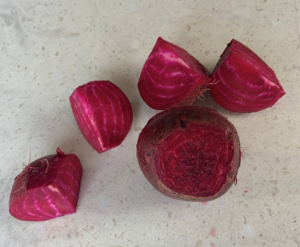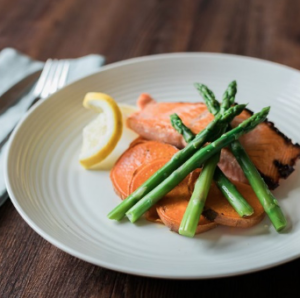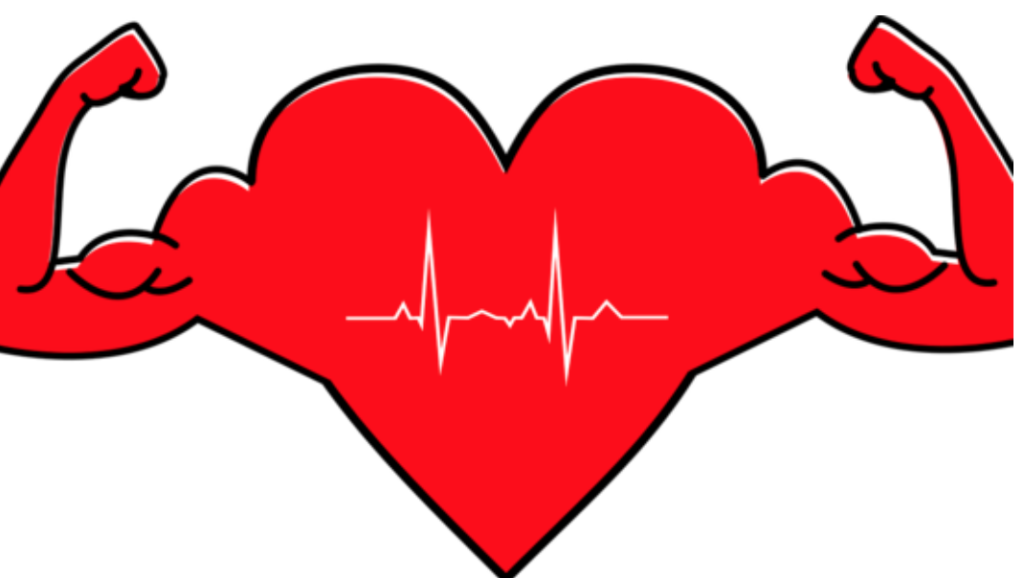It’s That Easy!
February is heart health month, so let’s tackle a couple of easy things we can do to keep the ol’ ticker happy and healthy.


1. Eat more beets. Just don’t panic when you notice a red tint to your morning bowel movement the next day. That shockingly deep red-purple color is due to a component called betalains, and makes its way into our poop and urine.
Betalains are so good for us because they are anti-inflammatory and can help fight cancer, cognitive impairment and are even antibacterial. They also can potentially help lower blood sugar levels.
Not to mention, they make a super cool natural food dye (check out the red velvet cupcake recipe below).
If you are new to beets, here’s a couple of amazing recipes to try:
- Warm beet salad with citrus dressing
- Borscht soup
- Red velvet mini cupcakes (they’re actually AMAZING)
Beets also play a role in producing something called nitric oxide in the body. Nitric oxide is critical for maintaining normal blood pressure. It also prevents inflammation and oxidative stress and can help support your immune system.
Beets, spinach, and radish are all dietary sources that promote nitric oxide production in the body.

2. Incorporate more omega-3 fatty acids. This may come as no surprise, considering that omega-3 fats are famous for their ability to lower triglyceride levels and inflammation and can improve heart rhythms, blood pressure and arterial health.
There are 3 main types of omega-3 fats: EPA, DHA, and ALA. However, they aren’t all the same.
EPA and DHA are the two types that will provide the greatest benefits to our health. ALA can be converted into EPA and DHA, but at a really low rate. So eating foods that rich in EPA and DHA (not just ALA) is important to get the benefit to our heart health.

Foods that are rich in EPA and DHA include: salmon, artic char, halibut, sardines, and mackerel. Wild fish will typically have a higher level of omega-3 than farmed fish. The recommendation is to have fish 2-3x/week to hit a good level of omega-3 fats.
Foods that are rich in ALA include: soybean, flaxseed, chia, hemp, linseed, rapeseed, and tree nuts. Unfortunately, these plant-based sources of omega-3 are not a good substitute for EPA and DHA because of the poor conversion rate.
Here are some delicious ways to incorporate foods rich in omega-3 fatty acids:
If you hate all of the above foods listed, don’t panic. Food provides the best therapeutic affect, but a supplement can still help!
In our western culture, 2-4g/day of EPA + DHA combined may be needed to reach the max health benefits. If you’ve ever taken an omega-3 supplement, you know they’re not tiny pills. Look for a high-dose supplement that gives you 0.5-1g per pill or teaspoon so you hit the therapeutic dose quickly.
If you have a fish allergy or are vegan, look for an algae-based omega-3 supplement.
NutraSea is a great supplement that is high dose and comes in liquid form, eliminating the need to swallow horse pills. They also provide plant-based sources.
Note: omega-3 fatty acids can have a blood-thinning effect. If you are on blood-thinning medication, please speak with your doctor, pharmacist, or dietitian before starting an omega-3 supplement.
3. Pet a dog. NOTHING to do with nutrition here, but studies do show that people with dogs may have experience heart related benefits.
People who own pets tend to exercise more (walking is excellent for your heart) and experience lower blood pressure when petting a dog. Dogs can tend to have a calming effect on us as well. That is when they’re not shredding your favorite slippers or barking at nothing in the middle of the night.
Over all, your good ol’ boy or girl may actually be helping your heart health, so give them an extra scratch today. You’ll both benefit.

There is so much we can do to improve heart health outcomes and reduce the risk of cardiovascular disease.
Simple changes to the diet done consistently over time is so much better than the ‘all or nothing’ approach we are all pretty guilty of taking. You don’t have to be perfect in your diet to be healthier.
Connect with our dietitian to discover what your unique nutrition needs are and how healthy, simple habits can make a difference in you and your family’s lives.
References:
Bryan NS. Functional Nitric Oxide Nutrition to Combat Cardiovascular Disease. Curr Atheroscler Rep. 2018 Mar 17;20(5):21. doi: 10.1007/s11883-018-0723-0. PMID: 29550903.
Elagizi A, Lavie CJ, O’Keefe E, Marshall K, O’Keefe JH, Milani RV. An Update on Omega-3 Polyunsaturated Fatty Acids and Cardiovascular Health. Nutrients. 2021; 13(1):204. https://doi.org/10.3390/nu13010204
Beręsewicz A, Gajos-Draus A. Enjoy your heart-beets. The role of dietary inorganic nitrate in cardiovascular health. Kardiol Pol. 2016;74(5):403-10. doi: 10.5603/KP.a2016.0028. Epub 2016 Mar 11. PMID: 26965924.
Madadi E, Mazloum-Ravasan S, Yu JS, Ha JW, Hamishehkar H, Kim KH. Therapeutic Application of Betalains: A Review. Plants (Basel). 2020 Sep 17;9(9):1219. doi: 10.3390/plants9091219. PMID: 32957510; PMCID: PMC7569795.






